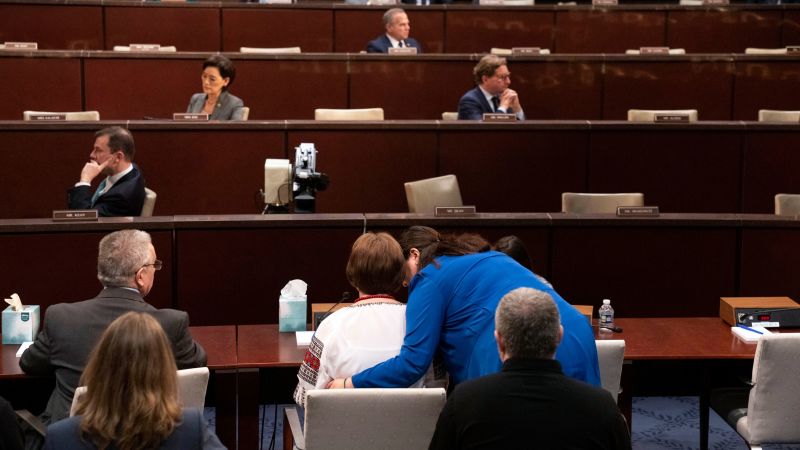
CNN
—
A 57-year-old Ukrainian woman from Kherson testified to US lawmakers that Russian forces beat her, threatened to rape her and forced her to dig her own grave.
Lyubov’s story was one of two powerful and horrific testimonies shared with House Foreign Affairs Committee members at a hearing about Russian war crimes Wednesday. Their last names were withheld by the committee at the survivors’ request.
Her experience, along with that of 16-year-old Roman, who was forcibly transferred to Russia and placed with a family who attempted to indoctrinate him, are just some of the tens of thousands of incidents of war crimes alleged to be committed by the Russians since their invasion of Ukraine last year.
Ukrainian Prosecutor General Andriy Kostin, who also testified at the hearing, said his office registered around 80,000 incidents of potential war crimes, and to date has convicted 31 Russians for war crimes in Ukrainian courts.
The hearing comes as some lawmakers work to rally continued support for Ukraine and push for the Biden administration to bolster the weapons it is providing Kyiv.
“These are more than war crimes. These are more than crimes against humanity. What we are witnessing in Ukraine is genocide,” Committee Chair Michael McCaul said in his opening statement.
“(Russian President Vladimir) Putin and Kremlin senior officials have made clear that their intent is to systematically wipe out Ukraine’s existence,” the Texas Republican said.
“The free world cannot sit idly by and allow this to happen. It is beyond time that this administration, along with our allies, provide Ukraine with the weapons they need to win,” he said, referencing long-range missile systems like ATACMS.
“Ukrainians will have to deal with all of the consequences of this evil act,” Ranking Member Gregory Meeks said.
“It will last a lifetime – the scars, the trauma,” the New York Democrat said.
Lyubov, who worked as an accountant, lived under Russian occupation for nearly a year and “in January of this year, they came for me,” she said.
Speaking via a translator, she said that Russian soldiers forced their way into her house, claiming they were looking for weapons, and confiscated “a map of Ukraine, the flag of Ukraine, souvenir magnets with Ukraine images, and a token with blue and yellow ribbon symbolizing victims of World War II.”
“Those were their evidence against me,” she said.
She was taken to what she called a “torture chamber” and held for five days, where she said she was beaten, forced to undress, cut with a knife and threatened with rape and murder.
“I also was taken out into the field and they beat me again and they were putting a handgun next to my head and shooting as if, as if executing me,” she recounted. “Also forced me to dig my own grave.”
She said she saw other people being tortured, “taken out with black plastic bags on their heads.”
“I worry so much for them. I would love to find them one day, but I am not sure if they’re still alive,” she said.
Lyubov said the soldiers let her go, “but they said they will come back.”
When she returned to her house, it had been looted, and they had taken away medals that belonged to her father.
She was able to flee Kherson and made her way to the United States to be with her daughter, but she hopes be able to return to Ukraine.
“I’m telling you my story, and there are other people who are getting robbed and raped and beaten in those territories now,” she said. “These terrible crimes need to be stopped.”
The second account shared with the committee was that of 16-year-old Roman, who was forcibly sent to Russia “for vacation,” according to his representative who briefed lawmakers via translator.
Last month, the International Criminal Court issued an arrest warrant for Putin and another top Russian official, Maria Lvova-Belova, for an alleged scheme to deport Ukrainian children to Russia.
Roman, who is an orphan, left his school after the Russian invasion of Ukraine and walked 60 kilometers (about 37 miles), all while allegedly being threatened by Russian soldiers along the way. After he reached his destination – a village in Donetsk – Russians occupied that village as well, and Roman was put in a local hospital with other children, the representative said.
“At that hospital, he was notified that he will now have a different family,” his representative said via a translator. “The occupation authorities ignored the fact and his words that he wanted his brother or sister to be his legal representatives because he had them there.”
The representative said he was then sent to another hospital in Donetsk, issued a new birth certificate on behalf of the self-declared Donetsk People’s Republic, and then was sent to Russia “for a vacation.”
Once there, Roman and other Ukrainian children were visited by Lvova-Belova, who told them they would be adopted, which the children protested. They were instead sent to a boarding school, the representative said.
“Eventually, they found a new family for Roman,” the representative said. “They tried to reshape his mind. … They made him watch propaganda programs on TV.”
His communication with his peers was restricted, his movements were tracked through his cell phone, and they “forced him to say that he liked his new family and his new life,” she said.
“He was forced to obtain a passport of the Russian Federation but then immediately they took it away from him, saying that they will process papers for adoption,” she said.
Roman was able to make his way back to Ukraine with the help of volunteers from the country, the representative said.

